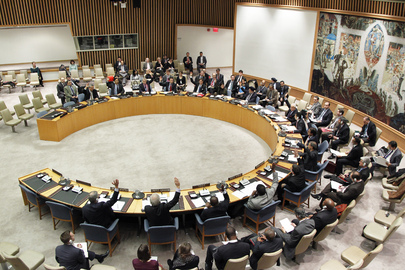Readings: Andrew Kent on Ex Parte Quirin
Andrew Kent (Fordham University School of Law) has posted a new paper to SSRN, "Judicial Review for Enemy Fighters: The Court's Fateful Turn in Ex Parte Quirin, the Nazi Saboteur Case." (66 Vanderbilt Law Review 101 (2013).) Professor Kent will be guest-posting about the article, so the Readings post will be brief, but we wanted to flag this interesting and provocative analysis of Ex Parte Quirin.
Andrew Kent (Fordham University School of Law) has posted a new paper to SSRN, "Judicial Review for Enemy Fighters: The Court's Fateful Turn in Ex Parte Quirin, the Nazi Saboteur Case." (66 Vanderbilt Law Review 101 (2013).) Professor Kent will be guest-posting about the article, so the Readings post will be brief, but we wanted to flag this interesting and provocative analysis of Ex Parte Quirin. Kent argues that the decision on court access was erroneous even under law at that time, and argues that it is ripe for reconsideration. SSRN abstract is found below the fold.
The last decade has seen intense disputes about whether alleged terrorists captured during the nontraditional post-9/11 conflict with al Qaeda and affiliated groups may use habeas corpus to challenge their military detention or military trials. It is time to take a step back from 9/11 and begin to evaluate the enemy combatant legal regime on a broader, more systemic basis, and to understand its application to future conflicts. A leading precedent ripe for reconsideration is Ex parte Quirin, a World War II-era case in which the Supreme Court held that saboteurs admittedly employed by an enemy nation’s military had a right to access civilian courts during wartime to challenge their trial before a military commission. Even though admitted members of an enemy nation’s military had never before accessed the civilian justice system during wartime, the Court in Quirin declined to explain why it reversed course in such a significant fashion. Since and because of Quirin, it has become accepted that literally any individual present in the United States has a constitutional right to habeas corpus. This Article first shows that on the legal merits, the Quirin Court’s ruling on court access was erroneous. The history of lack of court access for enemy fighters and nonresident enemy aliens is reviewed, starting with the English common law background on which the U.S. Constitution was written and continuing through the Founding period to the Civil War, World War I, and beyond. Second, the Article seeks to explain why the Court acted in such a surprising fashion in Quirin — ruling in favor of unsympathetic enemies during wartime, even though case law and other legal authorities provided solid reasons to reject their plea for court access. To do so, the Article draws on a diverse set of explanatory tools, including those of legal history and political science. Next, the Article shows that Quirin’s rejection of the old framework governing court access for enemy fighters and nonresident enemy aliens has had profound but underappreciated doctrinal consequences — including helping lead to the result in Boumediene v. Bush. The Article then argues that, as a policy matter, admitted or otherwise undisputed combatants in an enemy nation’s employ do not need and probably should not have a right to access U.S. courts during wartime. Quirin was thus wrong on the law and highly problematic as policy. Finally, the Conclusion highlights both current and potential future situations in which the Article’s legal analysis could be important.
Kenneth Anderson is a professor at Washington College of Law, American University; a visiting fellow of the Hoover Institution; and a non-resident senior fellow of the Brookings Institution. He writes on international law, the laws of war, weapons and technology, and national security; his most recent book, with Benjamin Wittes, is "Speaking the Law: The Obama Administration's Addresses on National Security Law."




